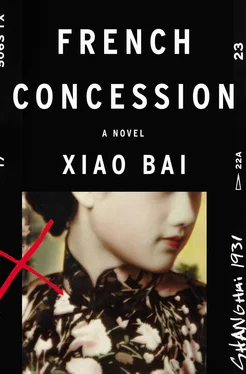Someone had written across the top of the first page of the document:
— selon la décision de la IIIème Internationale, le quartier général du mouvement communiste vietnamien déménagera dans le sud de la Chine. Ses dirigeants arriveront bientôt dans notre ville (Shanghai), leurs noms sont Moesso et Alimin.
It turned out that Mr. Zung was the Chinese agent for a foreign trading company registered in Hong Kong and run by a German woman whom the police later determined to be White Russian. She lived in an apartment in the French Concession, on the third floor of the Beam Apartments on the corner of Avenue Joffre and Avenue Dubail. A detective from Marseille, who fancied himself a poet, had described the building as an “ornate box with the scent of cape jasmine and osmanthus.” Lieutenant Sarly ordered an investigation into the occupants of the Beam Apartments, which turned up a report entitled “Personnalités de Shanghai,” a sixteen-page document that the secretariat nicknamed the VIP file. So it turned out the police did have information on this woman after all, buried in a list of Concession dignitaries. No one had taken the time to link her to the inconspicuous woman noted in the port customs files. The VIP file did not contain much information beyond an address, occupation, and phone number. But the detectives in the Political Section immediately began a preliminary investigation, and started writing their reports, a stack of which now lay at Sarly’s fingertips. On his table, rather, in his sunlit document tray.
The red brick building at 22 Route Stanislas Chevalier was the police headquarters. Sarly’s Political Section was on the northern side of the second and third floors. The building reeked of rosin and paraffin wax. Lieutenant Sarly dealt with the unbearable smell by endlessly smoking pipes. On humid spring days, this made the air in his office even more rancid. But in the afternoon, sunlight streamed into the room. The shade of the mulberry trees inside the walls extended onto the street, and two children in tatters stood on Route Albert Jupin, staring up at the tree. Afternoons in the South Concession were usually quiet apart from a couple of dogs barking from inside the jails on Rue Massenet.
The woman who lived in the Beam Apartments was a thirty-eight-year-old White Russian woman whom the Chinese referred to respectfully as Lady Holly. She apparently ran a jewelry store opposite the apartments on the corner of Avenue Dubail, under the sign ECLAT. The door faced Avenue Dubail, whereas the side facing Avenue Joffre was a storefront window shaded by curtains. The store occupied the ground floor of a two-story building, and when the family living upstairs hung their gray Chinese gowns out to dry without wringing them out, water would drip onto the ECLAT sign, said the report. Sarly recognized the hand of the poet from Marseille in this writing. Sarly himself was always encouraging his subordinates to write official reports with more flair. Details, he always said, stick closely to the details.
The jewelry store did mediocre business. Ever since the Russians flocked to Shanghai, the market had been flooded with large quantities of precious stones all said to be from the mines of the Urals, and it was hard to tell which ones were genuine. The Russian jewelry stores had Jewish storekeepers who all sported a scraggly beard full of crumbs and spit, like large furry animals with an air of Central Asia about them. The locals were skeptical of claims that distant offshoots of the tsar’s family had come to Shanghai with their wedding jewels tucked carefully away in trunks. Sergeant Maron, a man who sank his free time in Sherlock Holmes novels, pointed out that the jewelry shop could not possibly be making enough money to cover rent, much less subsidize Lady Holly’s lavish lifestyle.
Someone later put a list of names on his desk, with a note identifying it as a list of passengers on that French ship involved in the Kin Lee Yuen incident. He tossed the list onto the sofa, and did not look at it until the poet started screaming at the top of his lungs. Yes, that’s her, the White Russian princess of the Beam Apartments — that’s her beautiful ass! Only a poet could look at a name list and think of ass.
Of course, it could be a simple coincidence. But Sarly’s Corsican imagination told him that if one woman kept turning up everywhere you looked, and you persisted in thinking there was nothing to it, you must have some nerve to be denying the existence of God, of the great hands that arrange all earthly affairs.
Sarly knew that nearly everyone in the building called him “bow legs” behind his back. Like a retired jockey who had stopped caring about his weight, he pounded the black floorboards of the police station and made them creak. Not long after Sarly was posted to the Political Section, the atmosphere there changed. His predecessor had been on good terms with the local gangs and secret societies until someone had circumvented the colonial authorities and ratted him out to the Paris newspapers, after which the man had to be posted to Hanoi.
Sarly had two habits that distinguished him from his predecessor. To begin with, he liked tobacco pipes. From the document tray on his desk to the two telephones, a row of briar, agate, coral, and jade pipes adorned the room. This was a private hobby and had no impact on the rest of the Political Section. Rather, it was his predilection for paperwork that drove his subordinates crazy. Sarly liked to circulate documents in the office, as though he could only comprehend something when it had been written down with a name and rank attached to it.
Sarly sat placidly in his office, smoking and reading documents. The new leadership of the Political Section had ramifications beyond its walls. In the summer, the mulberry trees that shaded Route Albert Jupin attracted a crowd of urchins who often scaled the walls surrounding the police headquarters to reach the mulberries. The junior officers on duty had gotten in the habit of slipping out of the back door and catching a few boys, boxing their ears, and putting them to work polishing shoes, washing cars, sweeping floors, and scrubbing windows. That afternoon, they were hiding in the alleyway and ready to pounce when Sarly poked his head out of a third-floor window and stopped them.
The various subdivisions of the Political Section were further divided into smaller units. The Chinese men all worked for the Chinese police inspector, who also had two Chinese detective sergeants under his command. Foreigners were foreigners, whether Vietnamese or French, and Chinese were Chinese. So if a Frenchman wanted something from a Chinese detective, he would first have to speak to the Chinese inspector, who would then give the appropriate orders. Sarly cut through all the bureaucracy. His powerful bow legs kicked open the doors to every office in the building. He would assign work to anyone he saw fit, and he selected detectives from every division for a newly created detective squad that met every morning in a room on the end of the third-floor corridor. Everyone else called this meeting “morning prayers for the lieutenant’s bastards.” The French were infuriated by the fact that half the bastards were Chinese. Sarly’s theory was that the Political Section could not only be an elite force. To protect French colonial interests, it must be in touch with the local community.
Something occurred to Sarly, and he looked more closely at the list. He noticed that the White Russian woman had not been traveling alone. She had a companion, Hsueh Wei-shih, Weiss Hsueh. The discovery irritated him. At morning prayers the next day, he would chew his detectives out for not having done a thorough job.
The evidence suggested that Irxmayer and Co. were doing some alarming deals. Official documents listed the company as trading “household metal tools” and “commercial machine equipment,” which sounded less like a pretext than a rueful excuse: times are hard, so we had to specialize to stay afloat.
Читать дальше












